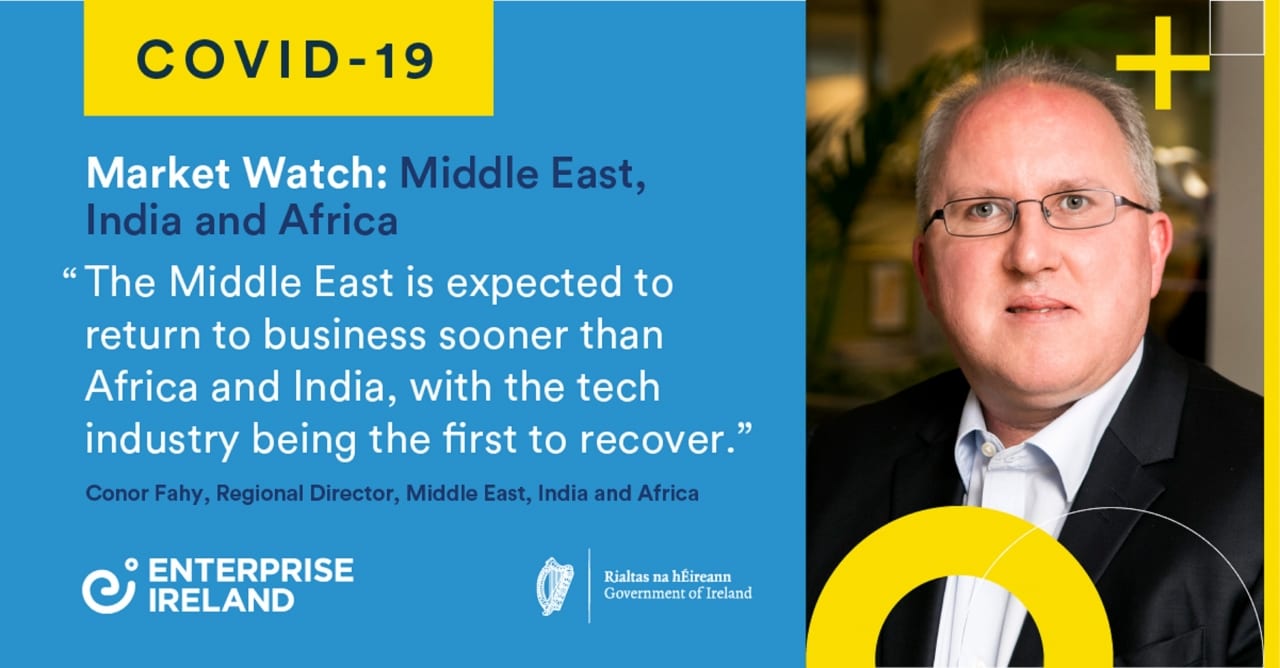The Middle East is expected to return to business sooner than Africa and India with the tech industry being the first to recover.
Key Takeaways
- Companies need to closely monitor the changing business environment and be prepared to quickly pivot their offer or business model if the market demands.
- Business is severely affected in the region even though the spread of the virus in Africa and India is weeks behind Europe.
- Borders have been closed, international events cancelled, and most companies are looking to cut costs.
- The Middle East is expected to return to business sooner than Africa and India with the tech industry being the first to recover.
- Communication is vital for to maintain long term relationships.
The global pandemic has indeed affected every corner of the world and according to Conor Fahy, Regional Director, Enterprise Ireland, India, the Middle East, and Africa is no different.
“The area encompasses over 40% of the world population so lockdown and self-isolation presents many challenges,” says the regional director. “The situation in the Middle East is similar to Europe in timing and response and most companies are expecting a decrease in revenue and are looking to cut costs and consider cost containment and defer or pause investments.
“The double whammy of an oil price war and Covid-19 will affect budgets and Dubai has introduced highly restrictive measures, including closing its airport, so there is a risk of a sharp increase in business defaults and liquidations in the travel and tourism industry. Also borders have closed across the region and major international events have been cancelled or delayed.
“India and Africa are currently around three weeks behind in terms of cases and government response. But business is severely affected, while economic activity is suffering from the initial phases of lockdown. The medium-term impacts will be severe and combined with oil-price shock and reduced demand for commodities, the region is likely to tip into an economic contraction in 2020/21, in the absence of major fiscal stimulus.”
There are eight Enterprise Ireland offices across the region which are helping Irish companies stay informed, connected and exporting. And Fahy says it’s crucial for people to avail of this support and keep communications lines open in order to survive the challenges.
“We are providing in-depth customer engagement, virtual itineraries, bespoke buyer webinars and one-to-one advice and guidance,” says Fahy.
“Personal connection is vital to winning and retaining business so it’s essential to stay connected with existing customers. Be the trusted source of information: and proactively communicate with accurate market information and insights from your industry contacts, and from Enterprise Ireland’s Market Research Centre. When things get tough, the temptation is to become acutely focused on immediate problems but while these should be addressed, developing a strategy for recovery is just as vital. So extend your timeline assumptions and planning-against scenarios, even if it appears difficult. Now is the time to invest in strategic planning and to start thinking through decision criteria and conditions for return to business.”
Many organisations are still dealing with immediate concerns around the availability of cash.
While all sectors are being affected across the region, Tourism, Aviation, Construction, Industrial Manufacturing and Mining and Oil industries have been hardest hit but technology related businesses will be the first to make a recovery.
“CFOs in the Middle East are expecting to get back to normal sooner rather than later; pausing or delaying investments instead of cancelling them altogether,” he says. “In fact, the majority expect to return to business as usual within three months if Covid-19 were to end today.
“Investments in digital transformation, customer experience and cyber security are most likely to be protected as a result of Covid-19 and all indicators point to a technology-led recovery as AI is becoming pivotal in managing the huge amounts of data needed to deliver services and product.” said Fahy
While there are certainly challenges facing Irish exporters, Fahy says there are also some emerging opportunities, particularly for digital payments and cloud services.
“The near collapse of many online grocery retail platforms is driving demand for process automation and intelligent self-service and Irish companies quickly recognize the changing market dynamics,” he says. “But while positivity may be in short supply, there is optimism in around returning to business and continuing to invest where it matters.
“Business leaders need to invest time away from crisis management to show leadership and strategically look to future opportunities which will emerge when these economies rebound.”



